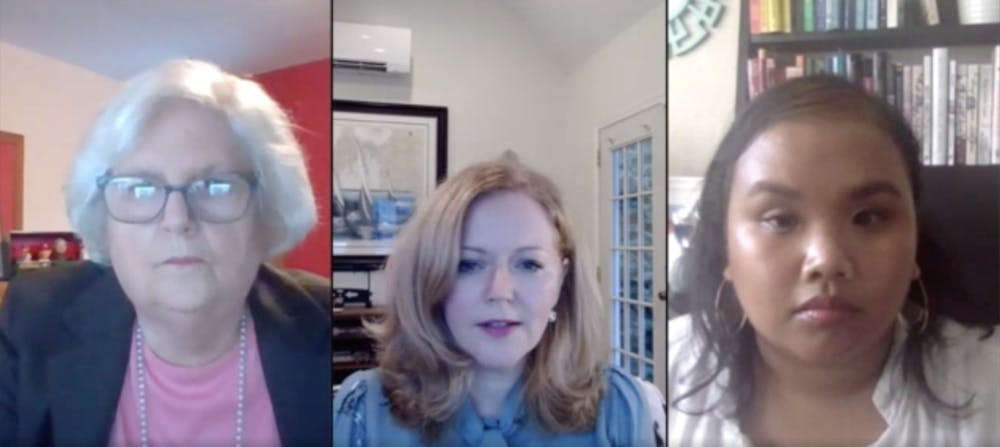The Women & Politics Institute hosted a discussion on “Gender and Generation” on Oct. 14, speaking about how gender and age can influence how one votes just weeks before the general election.
The institute is a nonprofit and nonpartisan group under the School of Public Affairs with the goal of closing the gender gap in politics. This discussion was part of their weekly virtual series “Women on Wednesdays” and was moderated by Betsy Fischer Martin, the executive director of the institute.
Melissa Deckman, chair and professor of political science at Washington College and an AU alumna, opened the discussion by presenting the results of surveys of Generation Z Americans, who are between ages of 8 and 23. She and Sara Guillermo, the executive director of IGNITE, collaborated on the surveys.
“I think it's really important to remember in our conversation about Gen Z voters just how diverse they are,” Deckman said. “That's really driving a lot of their political views and their partisanship.”
The discussion also featured Nancy LeaMond, the executive vice president of the American Association of Retired Persons.
According to Deckman, Gen Z Americans, unlike older adults, are less likely to be religious, with 40 percent describing themselves as religiously unaffiliated, and 47 percent saying they don’t often attend church. Additionally, one in four identify as LGBTQ+. Deckman said this is very different from older Americans and is a driving point for some of their viewpoints about politics and civil rights.
Deckman and Guillermo said they were also curious about what issues are motivating young women to vote. In 2019, before the pandemic hit, the top four issues were mass shootings, climate change, education and racial inequality. In May 2020, health care and jobs made their way up the list, presumably because of the coronavirus.
“I want to highlight that for reproductive health, always a big question for us, that was a fifth layer lingering part always for either 2019 and 2020,” Guillermo added.
For Gen Z men, jobs were consistently the number one issue, with education debt in second place and healthcare in third.
“That's also just an interesting difference based on gender, and how young women are choosing to vote based on these different issues that are impacting them every day,” Guillermo said.
LeaMond then spoke about the 50 plus women voting cohort and the issues they most value. Their voting cohort is 62 million people and represent about 50 percent of voters in key battleground states.
“They are not as diverse as younger generations as you've heard, but 50 plus women have a range of backgrounds and life experiences,” LeaMond said. “Seven in 10 are white, seven in 10 do not have college degrees, half are single, either separated, divorced, widowed or never married. And the average income is $36,000 a year.”
LeaMond described the cohort as “among the most anxious voters.”
They make less money than their male peers, take more time off of work to care for children and loved ones, which culminates in having less savings and social security benefits.
Older women were also more concerned than older men about financial security and healthcare, even before the pandemic, with Medicare and Social Security consistently being the most important issues to the cohort.
“Social Security, its long term sustainability and the fact that people are worried about cuts is always important,” LeaMond said. “Medicare being strong in this particular stage, people are very concerned about prescription drug costs. Interestingly, this go round and COVID undoubtedly fueled this.”





